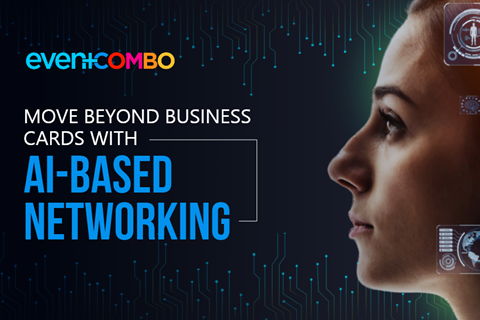

When it comes to adopting the latest event technologies, there are a plethora of options to choose from in today’s technology driven era. The trends are rapidly changing, especially in our post pandemic world, with tech continually emerging to refine and redefine the event ecosystem. Keeping an eye on the latest and emerging trends is crucial as it gives event planners a competitive edge. According to a study by Enterprise Event Marketing, utilization of apt event technology can increase attendance by 20%, and productivity by 27%.
However, technology is an ever-evolving concept and it is often difficult to decide which one would best meet organizational needs. To remain proactive and ahead of your competitors one needs to keep a tab on trends and strategize how to leverage technology for business growth.
Let’s take a look at the most popular tech trends of 2022.
1. AR/VR
Augmented Reality (AR) and Virtual Reality (VR) are technologies that aim to replicate real-world surroundings or enhance them like a stimulator. They design virtual environments in a way that the real environment coexists within. For example, VR can enable a user to have a boxing session with an animated version of Mike Tyson in a virtual boxing ring.
Among the latest tech trends, AR/VR is prevalent in a variety of business verticals, including, events, education, live entertainment, aviation, and construction. Businesses are utilizing AR/VR in testing of products, virtual tours of offices and buildings, and more. In light of the COVID-19 crisis, they have emerged as one of the most promising technology trends.
From our event industry’s perspective, AR/VR presents great networking opportunities among attendees. From the comfort of their homes, virtual and hybrid event participants can interact with fellow attendees in real-time. Participants can actually experience the event environment by wearing gadgets like eye-covering headsets along with headphones and walk into a virtual world like it’s a real one.
Interesting fact: According to a study by Goldman Sachs, the VR branded content market will become a huge source of $80 million of revenue generation by 2025.
2. Blockchain
Blockchain accumulates data in groups, which are called blocks, that carry information in sets. Every block has some storage capacity; once the storage is full it is closed and linked to previously filled blocks. This forms a chain of data called the blockchain. With such a setting it becomes impossible to add, remove, and change data without being traced. Thus, it offers an efficient way of managing electronic money and data transactions.
Let us now take a look at implementations of blockchain technology in virtual and hybrid events.
a) Blockchain and NFTs for event ticketing
Recently, many tech giants have started accepting blockchain-enabled cryptocurrency for their payments and related transactions. Paypal recently launched a crypto checkout service and Tesla enabled buying of cars with bitcoins, among many others.
Using blockchain and NFTs for event ticketing enables event organizers to keep a record of tickets post sale. All issued tickets are linked securely to the purchaser and any additional transaction on tickets is listed on the blockchain as well. A shared database of every activity eliminates the risks of uncontrolled pricing, scalping, or fraud.
NFT ticketing is yet another vertical which enables tickets to be used as a digital collectible item.
b) An efficient way of attendee management
Any event professional very well understands the importance of identity management. One can easily keep track of all attendee touchpoints and transactions by implementing blockchain technology. This way, event organizers can have access to attendee movements and behaviors during events. Further, it's easier to identify to whom the tickets were issued and verify their digital signatures. Overall, this helps in seamless attendee management during an event.
c) Artificial Intelligence
Artificial Intelligence enables computers and machine applications to replicate human intelligence, decision-making capabilities, and learning experiences. All these happen through algorithms and iterative processing. AI is often used for problem-solving, predictions, strategic business suggestions, etc.
An AI system functions by combining huge data sets with intelligent processing algorithms. Furthermore, it learns from data patterns and runs multiple rounds of data processing, measuring, and testing of its own performances in order to develop additional expertise.
A virtual event tech platform with an embedded element of AI helps organizers offer a more personalized experience to attendees. It is revolutionizing the event experience of both virtual and hybrid events by generating crucial insights.
Other benefits include:
i) Engagement
Virtual conferences don’t have to be boring. With AI, it is possible to create immersive and engaging real-time experiences. Many event tech platforms are leveraging this technology to create digitally attractive environments, based on attendee preferences, in order to increase active participation.
ii) Personalization
Event attendees love personalized experiences and AI can help you create them. For example, during registration attendees can mention their interests and what is it that they are expecting from the event. With the help of AI, event profs can match their profiles and interests to like-minded attendees or sponsors. This helps foster right connections and create a better experience for all event stakeholders.
iii) Automation
AI automation can save a lot of time and money by automating multiple tasks which otherwise are tedious to handle.
4. Facial Recognition
Facial recognition is a biometric technology that analyzes an individual’s picture and scrutinizes data from it. This data is translated into an algorithm, also referred to as ‘facial fingerprint’. The moment everyone’s “facial fingerprints” are encoded into the database, it can be used to distinguish identities at security checkpoints of an event.
These days facial recognition technology enables people to use their face as an ID for invitation benefits. It also saves time by taking care of security and providing a hassle-free check-in and registration process.
5. Live-Streaming
Live-streaming is another interesting technology that offers a lot of interactions and active participation during an event just like in-person events. Many event planners these days opt to host ‘strictly virtual events’ because of the benefits they offer like efficiency, convenience, and, the biggest of all, ease of set up and cost effectiveness. Live streaming technology can make such events excitingly interactive.
A virtual video hosting platform uses appropriate technology for seamless live streaming. Event tech platforms like Fireworks™ by Eventcombo offer appropriate tools to help event planners broadcast their videos to the attendees, overcoming geographical constraints.
6. Virtual Event Ticketing
Virtual event ticketing helps organizers create and sell tickets online. Additionally, it also helps in tracking and managing event attendees. Certain event tech platforms also help event organizers with customized tickets, confirmation emails, personal email invites, check-in integration, and tools for community engagement.
7. 5G
Many artists, events, and conference organizers are eagerly attempting to boost online engagement with their audiences. An introduction of 5G ecosystem can provide any kind of in-person, virtual or hybrid event with a new and evolving opportunity by strengthening connections with attendees, sponsors, and brands associated with the event.
For example, e-sports rapidly gained popularity in the US during the worldwide lockdown. Sports event organizers recreated competitions to make them more engaging through e-sports. NFL players participating in a digital game tournament garnered much interest, which was also showcased on national television. Although traditional sports events are resuming again, environments like these, supported by 5G technology, will continue to rise in popularity.
8. IoT
IoT (Internet of Things) is currently addressing another change with items in the real-world becoming network-empowered to communicate and collaborate with individuals and with one another. Today, we live in a connected world where devices are used incessantly for storing and exchanging information. By deploying IoT technology, event managers can gather useful data and use it to provide refined experiences to attendees. Smart usage of attendee information can help in making informed decisions and improving customer engagement.
These are the most trending technologies that are innovating the event industry in 2022. As these technologies continue to evolve, more revolutionary events are expected to surface, taking attendee experience to the next level. The event industry is gearing up for many new and exciting phenomena. Is your organization stepping up its tech game?

Networking is one of the most valuable ways to discover boundless opportunities and for 77.7% of business professionals , in-person conferences open a greater scope to make rewarding connections.

When planning a healthcare fair, the goal goes beyond booking a venue and sending out invites. You’re creating an event that brings together healthcare professionals, researchers, and exhibitors, all seeking value and...

Diversity and inclusion are at the heart of the events industry, where planners are focused on creating experiences that bring together people from all walks of life.